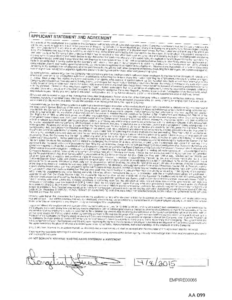In Fuentes v. Empire Nissan, Inc., it appears that Nissan attempted to test the limits of the use of small print in contracts.[1] The plaintiff was a discharged employee who sued in a superior court, arguing that the arbitration agreement in the contract that they had signed with Nissan was unconscionable. At first, the California Court of Appeals seemed sympathetic, remarking on the contract: “The longest paragraph squeezed something like 900 words into about three vertical inches.” The California Court of Appeal was so struck by the document in question that it uploaded the contract photocopy as an appendix to the opinion from the court record to demonstrate its lamentable quality. It is reproduced at the end of this article as well (without shrinking).
According to the dissenting opinion: “The arbitration agreement speaks for itself. The print is so fine it is unreadable without magnification. See if you can read it without giving up.” However, in order to prevail on a theory of unconscionability both procedural unconscionability and substantive unconscionability must be present. The Court of Appeals in Fuentes held: “Font size and readability thus are logically pertinent to procedural unconscionability and not to substantive unconscionability.” To hold otherwise, Fuentes claimed, would be to count font size twice, something the court was unwilling to do. Substantively fair or unfair contracts can be any size.
The court was alarmed by an analysis that could result in reducing “the unconscionability doctrine into a one-element defense where the sole issue would be whether there is procedural unconscionability.” Yet Fuentes noted in the same paragraph that “there is procedural unconscionability whenever one party has superior bargaining power and presents a contract of adhesion on a take-it-or-leave-it basis. That describes innumerable contracts, especially in the online world, where the standard contract is take-it-or-leave-it.” If so, unconscionability is already a single-element defense in most cases. Despite characterizing the contract’s defects as matters of procedural unconscionability, Fuentes concluded: “Given that there is no substantive unconscionability, we need not and do not address procedural unconscionability.”
Fuentes explicitly disagreed with a prior appellate case, Davis v. TWC Dealer Grp., Inc., 41 Cal. App. 5th 662 (2019), “which invalidated a substantially similar arbitration agreement.” Indeed, Davis held that excessively small print was a facet of substantive unconscionability. Davis did not provide analysis for this point, but it did cite OTO, L.L.C. v. Kho which stated: “Unconscionable terms… may include fine-print terms.”[2] Fuentes found that Kho judged a substantially similar arbitration agreement.
Although the Court in Fuentes enforced the arbitration agreement, it seems doubtful that a contract drafter would be flattered by an appellate court remarking on their work of art: “Is it strange that a contract can be enforced when it is nearly impossible to read? Contract law enforces contracts you cannot read at all, if you are blind, or illiterate, or the contract language is foreign to you.” In contrast, the dissenting opinion theorized that the font was so small that the terms were “unknowable.” As the employer who formed the contract terms would know them, there would be a lack of mutuality—a cause for substantive unconscionability. The dissent did not mention the majority opinion’s suggestion of a magnifying glass.
According to Fuentes, a contract can be binding even with font requiring “a strong magnifying glass.” Neither the majority opinion nor the dissenting opinion addressed the possibility of a font size so small it is not perceived as writing or detected at all. A person with healthy vision may be able to read text with a strong magnifying glass, while others may require a microscope. Fuentes leaves a split within the California Court of Appeals regarding the effects of excessively small print on the analysis of substantive unconscionability.
If you have questions or concerns about how these news reports may affect you or your business, please contact The Burton Law Firm at: 916-822-8700 or email info@lawburton.com for a consultation.
Fuentes Contract

[1] Fuentes v. Empire Nissan, Inc., No. B314490, 2023 WL 3029968 (Cal. Ct. App. Apr. 21, 2023).
[2] OTO, L.L.C. v. Kho, 8 Cal. 5th 111, 130 (2019).


